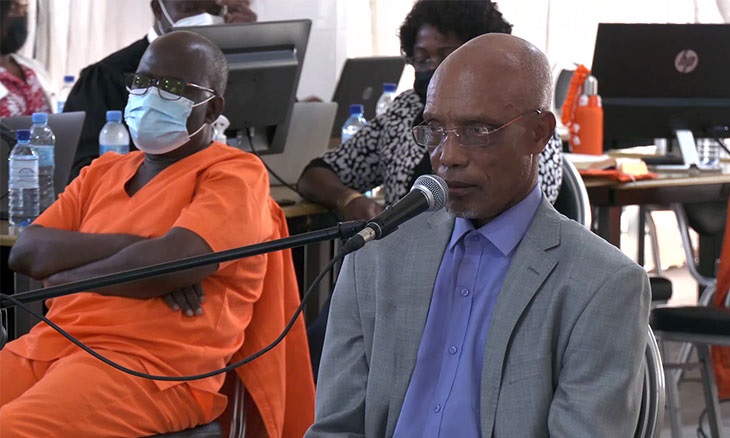Mozambique: Police officer lynched in Zóbuè
Hidden debts: Former Fisheries Minister learnt of Ematum from the press – AIM report

Photo: O País
Mozambique’s former Minister of Fisheries, Vitor Borges, on Monday told the Maputo City Court he was not aware that there was any defence and security component to the Mozambique Tuna Company (Ematum) until the matter was raised by an opposition deputy during a debate in the Mozambican parliament, the Assembly of the Republic, in November 2013.
Ematum is one of three fraudulent companies that are at the heart of the scandal of Mozambique’s “hidden debts”. The companies obtained loans of over two billion US dollars from the banks Credit Suisse and VTB of Russia in 2013 and 2014. The loans were only possible because they were guaranteed by the government of the day, led by the then President Armando Guebuza.
Testifying in the trial of 19 people facing charges of financial crimes linked to the “hidden debts”, Borges claimed that the first he had heard of Ematum was through the press. He did not know where the idea to set up the company had come from, but the head of economic intelligence of the Intelligence and Security Service (SISE), Antonio Carlos do Rosario, asked him for names of people in the fisheries sector who could sit on the Ematum board.
Rosario, who is one of the main accused in the current trial, told the court last year that Ematum was a security operation disguised as a fishing fleet. But none of the witnesses who worked at Ematum have backed up this extraordinary claim. None of them had seen any equipment on the Ematum fishing boats that could have been used for defence purposes.
Borges himself said that when he had visited the boats all he had seen was fishing equipment, and no defence or security devices.
Nonetheless the parliamentary debate changed his mind. Both the opposition parties, Renamo and the MDM (Mozambique Democratic Movement) had demanded information about the 850 million dollar loan to Ematum from Credit Suisse and VTB.
Borges said these were questions that the then Finance Minister, Manuel Chang, who signed the loan guarantees, should have answered – but the government insisted that Borges address the Assembly in the vain hope that he could distract deputies’ attention away from the money, and onto the government’s tuna fishing policy.
This, he said, was the strategy of the government and the parliamentary group of the ruling Frelimo Party, in order to stop the deputies talking about the financial issues.
Of course, it did not work. By late November 2013, Ematum was already mired in controversy because of the purchase of 24 tuna fishing vessels and six patrol boats from a shipyard in Cherbourg, France, owned by the Abu Dhabi-based group, Privinvest. This was financed by EMATUM issuing bonds to the total value of 850 million US dollars on the European markets.
Borges insisted that the deal had nothing to do with acquiring military equipment. But on Monday he admitted to having second thoughts when an opposition deputy claimed that 350 million dollars from the Ematum loan had been diverted to military purposes.
The Assembly jumped on this claim to downsize the Ematum loan, ensuring that in the General State Account (CGE), the loan to Ematum was stated as 500 million dollars, and the other 350 million dollars was shifted to the Defence Ministry.
Later, this accounting wizardry became even bolder – cutting the Ematum debt to 350 million dollars, and claiming that the defence ministry had gobbled up 500 million. Of course, this did not change the fact that the creditors wanted the whole 850 million dollars back.
Asked whether any defence equipment had really been acquired, Borges said it must have been – but could only cite the Assembly’s mathematics to defend this – and then admitted that the real purpose of this juggling was to bring the Ematum debt down to apparently tolerable levels.
There are several good reasons for believing that none of the loan money was diverted to the military. First, Credit Suisse and VTB would not have lent the money, had they known that much of it was going to the military. Second, the Defence Ministry itself has always insisted that it never received anything from the Ematum loan. And third, the money did not even go to Mozambique.
The entire loan was sent to Privinvest, as the sole contractor for Ematum. Privinvest insists that it does not supply military equipment, and although there is much that is deeply dishonest about Privinvest, there is no reason to doubt this claim.
In other words, there remains a 500 million dollar shaped hole in the Ematum loan. The independent audit undertaken by the company Kroll in early 2017 could find no trace of this money.
Borges seems to have forgotten some of the more embarassing claims in his statement given to the Assembly. From AIM’s coverage of that speech, we know Borges denied there was any risk that Ematum would default on its repayments or that the government would be obliged to bail it out.
He said that from the second year of Ematum’s operations, the company would be able to pay for its own running costs and service its debt. Borges predicted that when the fleet was fully operational it would bring in revenue of 200 million dollars a year.
In fact, Ematum was in deep financial difficulties by 2015, and its boats did very little fishing – indeed about half the Ematum fleet was never able to obtain fishing licences. The company went bankrupt and is being wound up. The government was forced into repeated negotiations with the holders of the Ematum bonds. Responsibility for repayment has been switched from the company to the government, and the repayment schedule will last for another decade.
Since the boats were being built in Cherbourg, the French press took an interest in Ematum, and put the cost of the boats at 300 million dollars. So what would the other 500 million dollars of the loan money be spent on?
Borges said the rest of the money would be spent on radar equipment, satellite communications, onshore installations, transfer of technology, licence fees, training, and the running costs and payment of interest on the loan for the first year.
This was nonsense – the radar equipment and the satellite communications, for instance, were covered, not by Ematum, but by the loan to its sister company, Proindicus. But Borges did not tell the Assembly about Proindicus or about the loan to a third fraudulent company, MAM (Mozambique Asset Management), The Proindicus and MAM loans were kept deeply secret and it is quite possible that in 2013 Borges did not know about them.
He noted, accurately enough that it was in 2016, when the Proindicus and MAM loans became public knowledge, that Mozambique was plunged into a financial crisis.
Asked whether the Mozambican people and state had been damaged by the Ematum scandal, Borges, in a masterpiece of understatement, replied, “it could have been done better”.












Leave a Reply
Be the First to Comment!
You must be logged in to post a comment.
You must be logged in to post a comment.